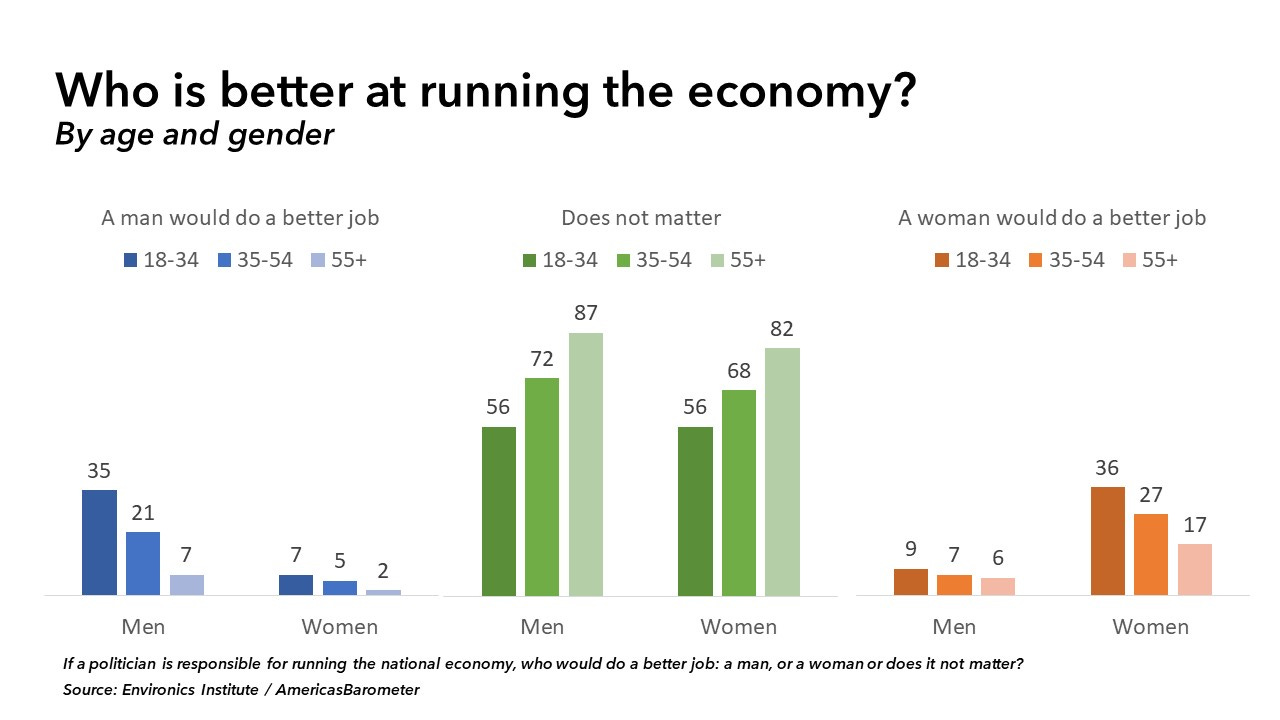Older and wiser...and more feminist
We can’t assume that each new generation will be more progressive than the last
It’s natural to assume that younger generations are on the leading edge of social change. Youth, for instance, are presumably the most comfortable with diversity and equality, and with challenging old-fashioned stereotypes. Their parents and grandparents must be more resistant to change and more nostalgic for a simpler past, where, as someone more famous than me recently put it, “men were men and white men ruled.”
But it's not always like that.
Consider two questions about gender and political leadership. Most Canadians (73%) disagree that men make better political leaders than women. Most (72%) also say it makes no difference whether we have a man or a woman in charge of running the economy. So far, so good.
Here's how answers to the first question look by age and gender.
In each age group, men are more likely than women to agree that “in general, men are better political leaders than women.” But, while this gender difference may not be that surprising, the differences across age groups certainly are. Younger men are actually more likely to agree than they are to disagree that men make better political leaders than women. But most striking is the fact that younger men (age 18 to 34) are three times more likely to agree than older men (age 55 and older).
The age differences among women are not as stark, though younger women are still twice as likely to agree than older women. But if you look closely, you might notice that younger women (29%) are more likely than older men (17%) to agree that men are better political leaders than women.
Bet you didn’t see that one coming, did you?
Here are the results for the second question. There is a gender difference here, in that just over one in three younger men say that a man would be better at running the economy, while just over one in three younger women say that a women would be better. But, again, this type of difference is somewhat predictable. The more surprising part is the difference among men across age groups.
I don’t have a simple explanation for these patterns. Maybe second-wave feminism had more of a lasting impact on younger people at the time (who are now older people) than what came afterwards. Maybe the discourses and images currently in circulation online are denting perceptions of gender equality. Changing patterns of immigration could be playing a role, at least in the short term.
But, whatever the reason, it’s too simple to assume that each new generation will be more progressive than the last.
This data presented in this post is from the Canadian portion of the 2023 AmericasBarometer. The AmericasBarometer is a biennial comparative survey of democratic values and behaviours that covers countries in North, Central and South America, as well as a significant number of countries in the Caribbean (the 2023 survey covers 25 countries). The project is led by the Latin American Public Opinion Project (LAPOP) at Vanderbilt University.
The survey is the most comprehensive source of information about support for democracy in Canada. Follow the Environics Institute to catch more reports from this survey.
The 2023 AmericasBarometer in Canada survey was conducted by the Environics Institute for Survey Research, in partnership with LAPOP at Vanderbilt University. It was conducted online with a representative sample of 2,500 Canadians (aged 18 and over) between July 20 and August 4, 2023. The author is solely responsible for any errors of presentation or interpretation.
What is the Environics Institute for Survey Research? Find out by clicking here.
Follow us on other platforms:
· Twitter: @Environics_Inst or @parkinac
· Instagram and Threads: environics.institute




